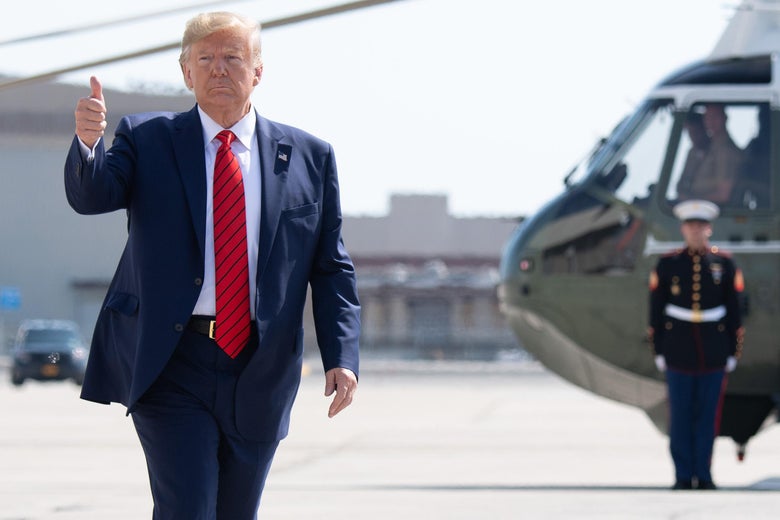
Conservative outlets think Trump will be fine.
SAUL LOEB/AFP/Getty Images
On Thursday, Congress released the anonymous whistleblower complaint alleging that President Donald Trump had pressured President Volodymyr Zelensky of Ukraine to investigate Joe Biden and his son Hunter during a July 25 phone call. The full complaint has intensified the calls for Trump’s impeachment, as it further suggests that White House lawyers tried to cover up the details of the call by instructing staffers to remove the complete, word-for-word transcript from the computer system where it normally would have been stored. White House staff instead stored the transcript in an electronic system usually reserved for especially sensitive information pertaining to national security. The whistleblower also details trips that former New York City Mayor Rudy Giuliani, now Trump’s personal lawyer, took to allegedly follow up with Zelensky and encourage him to investigate Biden.
Coverage of the complaint from conservative news outlets has questioned the accuracy of the whistleblower’s account, zeroing in on a line from the complaint that reads, “I was not a direct witness to most of the events described.” In the complaint itself, the whistleblower follows that statement by noting, “However, I found my colleagues’ accounts of these events to be credible because, in almost all cases, multiple officials recounted fact patterns that were consistent with one another. In addition, a variety of information consistent with these private accounts has been reported publicly.” The whistleblower’s account lines up with media reports on the Ukraine scandal and with the rough transcript of the call that the White House released on Wednesday. Earlier in the complaint, the whistleblower also writes, “It is routine for U.S. officials with responsibility for a particular regional or functional portfolio to share such information with one another in order to inform policymaking and analysis.”
The Federalist labeled this information-sharing as “an elaborate gossipy game of telephone.” Articles in the PJ Media, the National Review, the Daily Wire, and other conservative outlets have also referred to the contents of the complaint as “hearsay.” These four outlets have further noted that the whistleblower’s sources are anonymous. As the article in the National Review reads, “[The whistleblower’s] term-paper report is laden with anonymously sourced rumors.” Republican politicians have been making the same point as well: Donald Trump sent out a tweet on Thursday reading, in part, “A whistleblower with second hand information? Another Fake News Story!” and South Dakota Sen. Mike Rounds commented on the complaint to CNN saying, “they are using second-hand information right now. Let’s let the committee investigate it.”
As was the case in its coverage of the release of the rough transcript of the Ukraine call on Wednesday, the Federalist has been publishing strongly-worded opinion pieces on the complaint with titles like “Blatant Media Lies About Trump-Ukraine Non-Scandal Are Never-Ending” and “Complaint From So-Called ‘Whistleblower’ Is Riddled With Gossip, Blatant Falsehoods.”
The latter piece, which is the Federalist’s main article outlining the contents of the complaint, argues that the whistleblower is trying to spin a narrative “that is directly contradicted by underlying facts.” The piece doesn’t make much of the allegation that White House officials tried to cover up records of the conversation. It dismisses the complaint’s description of a White House source who believed that the call was not pertinent to sensitive national security issues , and thus saw it as improper to store the complete transcript in the electronic system reserved for especially sensitive information. The Federalist article argues that this is merely the “opinion of an anonymous official” and points out “Trump formally declassified the transcript of the phone call, which had previously been classified as ‘SECRET/NOFORN,’ meaning the information could not be shared with uncleared U.S. individuals or any foreign nationals, earlier this week.” Daily Caller editor-in-chief Ben Shapiro made a similar point on Twitter, asking, “So just to be clear, the big bombshell from the whistleblower report is that Trump covered up a transcript that he just released to the public yesterday?” This characterization neglects the fact that the rough transcript that the White House released was a reconstruction of the conversation based on the notes and memories of those who listened to the call. The whistleblower was referring to a complete “word-for-word” transcript, which has yet to be released, in his description of the alleged cover-up. He also writes, “I do not know whether similar measures were taken to restrict access to other records of the call, such as contemporaneous handwritten notes taken by those who listened in.”
Conservative outlets have also questioned the intentions and character of the anonymous whistleblower. Writers at these publications have described the complainant variously as “anti-Trump,” “Trump hating,” “rumor-mongering,” a “partisan federal employee,” and “likely to be some third-tier Brennan or Clapper-like intelligence operative.” Several outlets have published a viral Twitter thread from Fred Fleitz, a former CIA analyst who worked in the Trump administration as the chief of staff of the National Security Council. In the thread, he suggests that the complaint is “too convenient and too perfect to come from a typical whistleblower.” Fleitz muses that the whistleblower might have had help from “outside groups opposed to the president” and argues that his actions are “a grievous violation of trust between the IC [Intelligence Community] and the White House.” The Daily Wire and PJ Media, which both highlighted the thread, did not mention that Fleitz is a former Trump administration official in their articles.
Readers like you make our work possible. Help us continue to provide the reporting, commentary and criticism you won’t find anywhere else.
Join Slate Plusfrom Slate Magazine https://ift.tt/2n0sFub
via IFTTT
沒有留言:
張貼留言